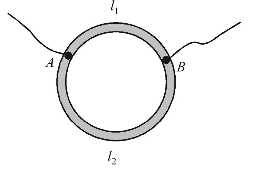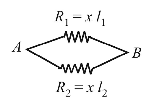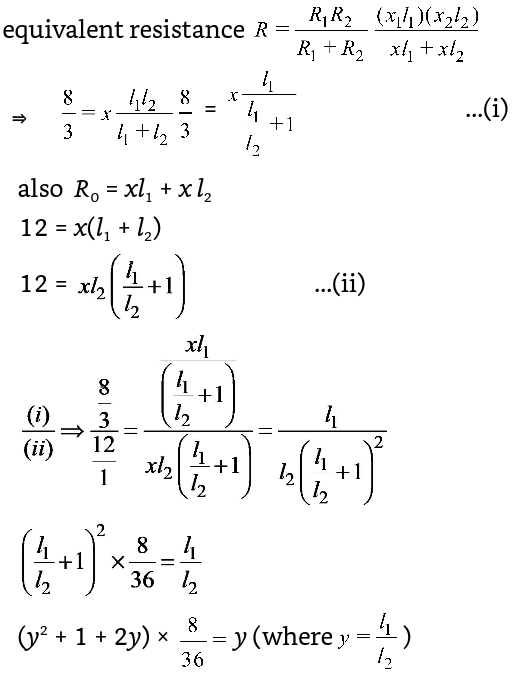Current Electricity
- Si and Cu are cooled to a temperature of 300 K, then resistivity?
-
View Hint View Answer Discuss in Forum
Conductivity of semiconductor increases with increase in temperature while conductivity of metal decreases with increase in temperature.
Correct Option: B
Conductivity of semiconductor increases with increase in temperature while conductivity of metal decreases with increase in temperature.
- A wire has a resistance of 3.1Ω at 30ºC and a resistance 4.5Ω at 100ºC. The temperature coefficient of resistance of the wire
-
View Hint View Answer Discuss in Forum
R1 = 3.1 Ω at t = 30°C
R2 = 4.5 Ω at t = 100°C
We have, R = R0 (1 + αt)
∴ R1 = R0 [1 + α (30)]
R2 = R0 [1 + α (100)]⇒ R1 = 1 + 30α R2 1 + 100α ⇒ 3.1 = 1 + 30α ⇒ α = 0.0064 °C-1 4.5 1 + 100α
Correct Option: A
R1 = 3.1 Ω at t = 30°C
R2 = 4.5 Ω at t = 100°C
We have, R = R0 (1 + αt)
∴ R1 = R0 [1 + α (30)]
R2 = R0 [1 + α (100)]⇒ R1 = 1 + 30α R2 1 + 100α ⇒ 3.1 = 1 + 30α ⇒ α = 0.0064 °C-1 4.5 1 + 100α
- The resistance of a discharge tube is
-
View Hint View Answer Discuss in Forum
In discharge tube the current is due to flow of positive ions and electrons. Moreover, secondary emission of electrons is also possible. So V-I curve is non-linear; hence resistance is non-ohmic.
Correct Option: C
In discharge tube the current is due to flow of positive ions and electrons. Moreover, secondary emission of electrons is also possible. So V-I curve is non-linear; hence resistance is non-ohmic.
- There are three copper wires of length and cross sectional area (L, A),[2L,(1/2)A] ,[(1/2)L, 2A] . In which case is the resistance minimum?
-
View Hint View Answer Discuss in Forum
R - ρ L A R1 = ρ L ...(i) A R2 = ρ 2L × 2 ...(ii) A R 3 = ρ L = ρL ...(iii) 2.2A 4A
⇒ R3 < R1 < R2Correct Option: B
R - ρ L A R1 = ρ L ...(i) A R2 = ρ 2L × 2 ...(ii) A R 3 = ρ L = ρL ...(iii) 2.2A 4A
⇒ R3 < R1 < R2
- A ring is made of a wire having a resistance R0 = 12 Ω. Find the points A and B as shown in the figure, at which a current carrying conductor should be connected so that the resistance R of the sub-circuit between these points is equal to 8/3 Ω .

-
View Hint View Answer Discuss in Forum
Let x is the resistance per unit length then


8y² + 8 + 16y = 36y
⇒8y² – 20y + 8 = 0
⇒2y² – 5y + 2 = 0
⇒2y² – 4y – y + 2 = 0
⇒2y (y – 2) – 1(y – 2) = 0
⇒(2y – 1) (y – 2) = 0⇒ y = l1 = 1 or 2 l2 2
Correct Option: D
Let x is the resistance per unit length then


8y² + 8 + 16y = 36y
⇒8y² – 20y + 8 = 0
⇒2y² – 5y + 2 = 0
⇒2y² – 4y – y + 2 = 0
⇒2y (y – 2) – 1(y – 2) = 0
⇒(2y – 1) (y – 2) = 0⇒ y = l1 = 1 or 2 l2 2

